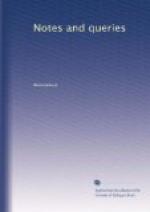Treasure Trove.—The prejudicial effect which the law of Treasure Trove, as it now exists in this country, has been found to exercise upon the preservation of objects of archaeological interest, especially if such articles happen to be formed of either of the precious metals, is just now exciting the attention of the antiquarian world. Any notes upon the state of this law upon the Continent, any references to instances of valuable “finds” which have been lost to archaeological investigation through the operation of this law, or to cases in which the decisions of the courts have been given upon questions of this law; in short, any hints {167} or information upon any points connected with the subject of Treasure Trove will be thankfully received by,
EFFESSA.
Poeta Anglicus.—The gloss on the Prooemium to the Constitutions of Clement V., col. iv. “Corp. Jur. Can.” t. iii. Lugd. 1671, has the following remark:—
“Et dicitur a Papae, quod est, interjectio admirantis, et vere admirabilis: quia vices Dei in terris gerit. Inde dixit ille Anglicus in poetria nova: Papa stupor mundi. Et circa fin., Qui maxima rerum, nec Deus es nec homo, quasi neuter es inter utrumque.”
Who is the Anglicus Poeta? What is the name of his poem?
J.B.
Hornbooks.—Can either of your numerous intelligent readers give me an account of the hornbooks from which our ancestors learned their letters? If so, I shall feel especially obliged for the information.
JOHN TIMBS.
Ben Jonson, or Ben Johnson.—Among some papers I possess of the Digby family, I have an autograph poem on The Picture of the Minde of the Lady Venetia Digby, by Ben “Johnson.” Is this the same as Ben “Jonson?” and if so, how comes it the “h” has been dropped from his name? Or was there some other Ben “Johnson,” a poet of that period?
N.A.B.
MS. Book of Prayers belonging to Queen Catherine Parr.—In vol. ix. of the Gentleman’s Magazine is a description of a MS. book of prayers, bound in silver, which probably belonged to Queen Catherine Parr. Can you or any of your numerous readers inform me in whose possession the volume is now?
J.L.W.
Waltheof—De Combre Family—Ilda.—In Waltheof, or the Siege of York, an historical drama published at York, 1832, one of the dramatis personae, Judith, the niece of the Conqueror, and daughter of the Countess of Albemarle, is made to say,—
“When gallant Waltheof, as his
country’s champion,
On bus’ness of high import and high
matters,
Oft at my royal uncle’s court
appeared,
...
“We married privately.
Two years and more have passed since this
has happened,
And one sweet pledge of love has crowned
our vows.”
Now I am anxious to know,




